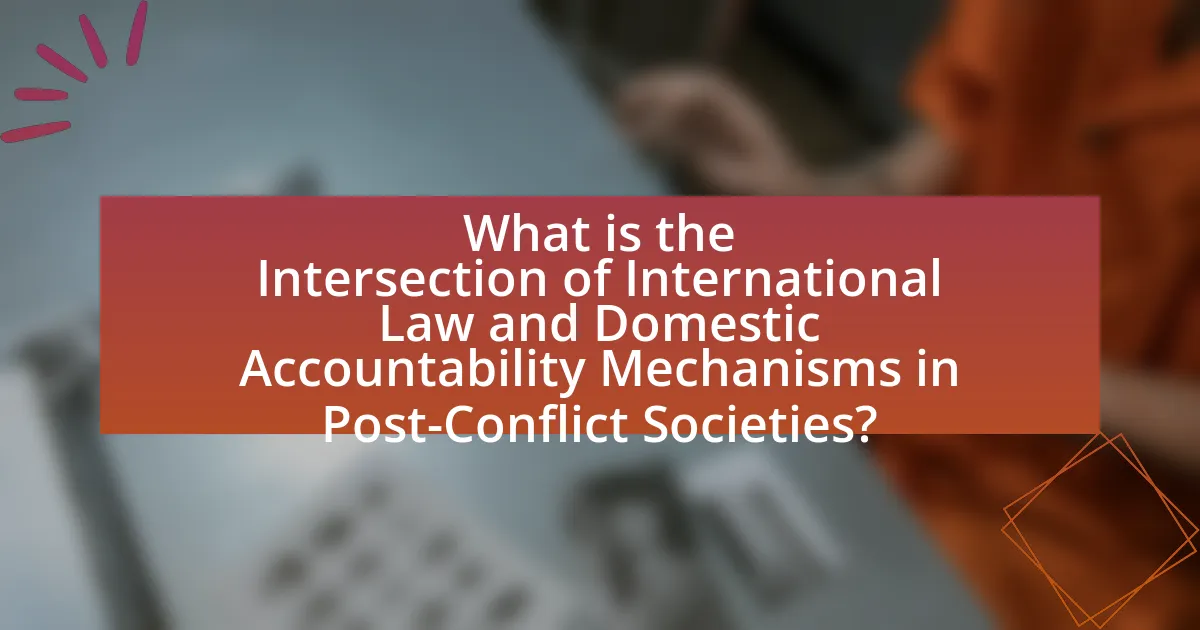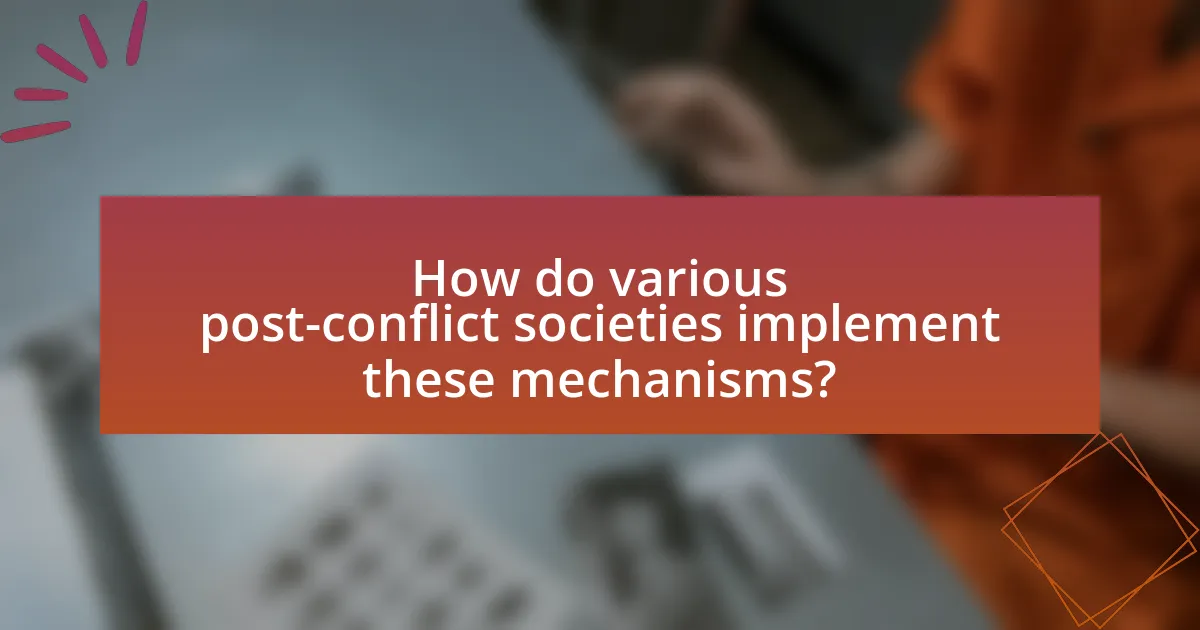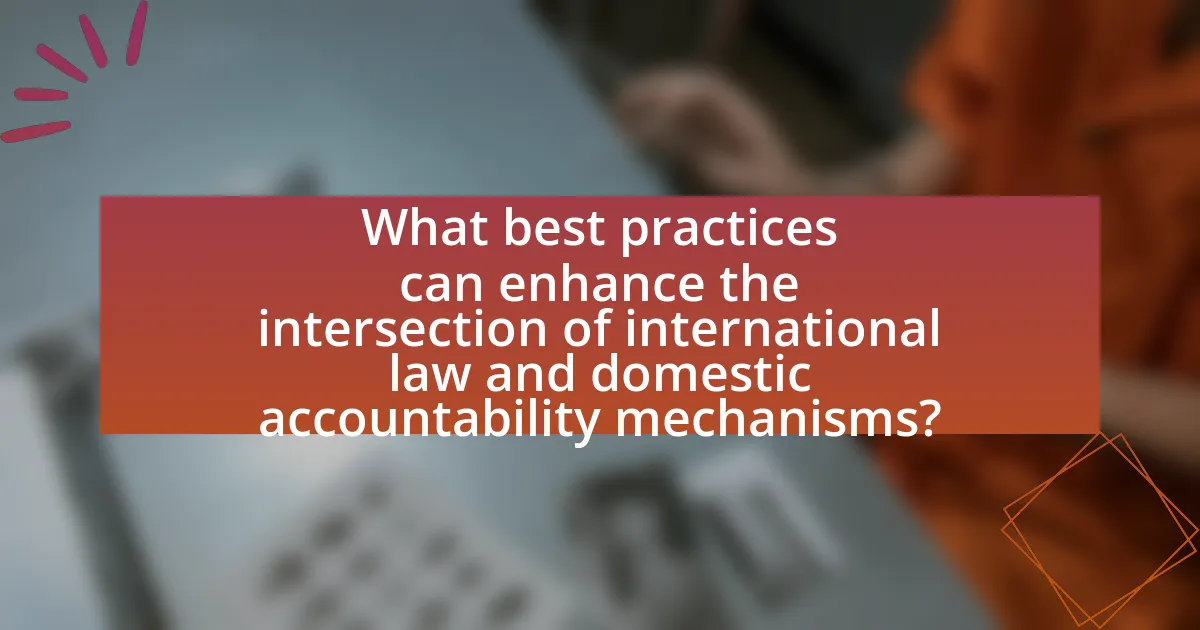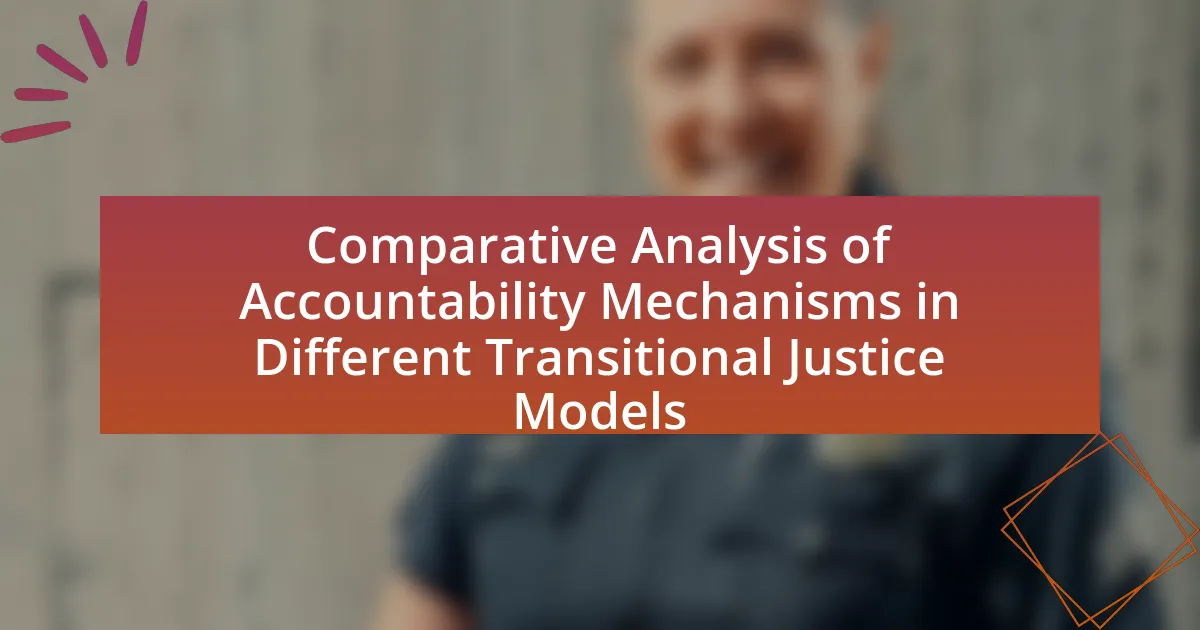The article examines the intersection of international law and domestic accountability mechanisms in post-conflict societies, highlighting the integration of global legal standards with local judicial processes to address war crimes and human rights violations. It discusses how international frameworks, such as the Geneva Conventions and the Rome Statute, interact with domestic systems to promote justice and reconciliation. Key principles of international law relevant to these contexts include the protection of human rights and the principle of accountability. The article also explores the challenges faced in implementing these mechanisms, the role of civil society, and best practices for enhancing accountability in post-conflict settings.

What is the Intersection of International Law and Domestic Accountability Mechanisms in Post-Conflict Societies?
The intersection of international law and domestic accountability mechanisms in post-conflict societies involves the integration of global legal standards with local judicial processes to address war crimes and human rights violations. This relationship is crucial for ensuring justice and reconciliation, as international law provides frameworks, such as the Geneva Conventions and the Rome Statute, which establish legal obligations for states to prosecute perpetrators of serious crimes. For instance, the establishment of hybrid courts, like the Special Court for Sierra Leone, exemplifies how international legal principles can be applied within domestic systems to enhance accountability. Such mechanisms not only promote adherence to international norms but also empower local institutions, fostering legitimacy and trust in the rule of law post-conflict.
How do international law and domestic accountability mechanisms interact in post-conflict settings?
International law and domestic accountability mechanisms interact in post-conflict settings by establishing a framework for justice that combines global standards with local legal processes. This interaction often involves international treaties and conventions, such as the Geneva Conventions, which set norms for accountability, while domestic mechanisms, like national courts or truth commissions, aim to address specific local grievances and promote reconciliation. For instance, the establishment of the International Criminal Court (ICC) complements national efforts by providing a venue for prosecuting war crimes when domestic systems fail, as seen in cases from countries like Uganda and the Democratic Republic of the Congo. This dual approach helps ensure that accountability is pursued at both international and local levels, fostering a comprehensive response to past atrocities.
What are the key principles of international law relevant to post-conflict societies?
The key principles of international law relevant to post-conflict societies include the protection of human rights, the principle of accountability, and the promotion of peace and security. Protection of human rights mandates that states uphold the rights of individuals, particularly those affected by conflict, as outlined in instruments such as the Universal Declaration of Human Rights. The principle of accountability emphasizes the need for justice mechanisms to address war crimes and human rights violations, supported by frameworks like the Rome Statute of the International Criminal Court. Lastly, the promotion of peace and security is guided by the United Nations Charter, which advocates for the peaceful resolution of disputes and the rebuilding of societies to prevent future conflicts. These principles collectively aim to foster stability and reconciliation in post-conflict environments.
How do domestic accountability mechanisms function within the framework of international law?
Domestic accountability mechanisms operate within the framework of international law by ensuring that states adhere to their obligations under international treaties and customary law, particularly regarding human rights and humanitarian standards. These mechanisms, such as national courts and truth commissions, are designed to investigate, prosecute, and provide remedies for violations of international law, thereby reinforcing the rule of law at the domestic level. For instance, the International Criminal Court (ICC) encourages states to prosecute war crimes and crimes against humanity domestically, promoting accountability through national legal systems. This interaction is crucial in post-conflict societies, where rebuilding trust and governance relies on addressing past atrocities and ensuring justice for victims.
Why is the intersection of these two areas significant for post-conflict recovery?
The intersection of international law and domestic accountability mechanisms is significant for post-conflict recovery because it establishes a framework for justice and reconciliation. This intersection ensures that international standards for human rights are upheld while allowing local systems to address grievances, fostering trust in governance. For instance, the establishment of hybrid courts, such as the Special Court for Sierra Leone, exemplifies how international law can complement domestic efforts to hold perpetrators accountable, thereby promoting societal healing and preventing future conflicts. This dual approach not only legitimizes the recovery process but also empowers local communities to engage in their own justice, which is crucial for sustainable peace.
What role does accountability play in rebuilding trust in post-conflict societies?
Accountability is crucial in rebuilding trust in post-conflict societies as it establishes a framework for justice and transparency. When individuals and institutions are held accountable for their actions during conflict, it fosters a sense of fairness and responsibility, which is essential for restoring public confidence. For instance, the establishment of truth commissions, such as South Africa’s Truth and Reconciliation Commission, has demonstrated that accountability mechanisms can facilitate healing by acknowledging past wrongs and promoting dialogue. Furthermore, research indicates that societies with robust accountability measures experience lower rates of recidivism in violence, as accountability helps deter future abuses and reinforces the rule of law. Thus, accountability not only addresses grievances but also lays the groundwork for sustainable peace and trust in governance.
How can international law support domestic accountability efforts?
International law can support domestic accountability efforts by establishing legal frameworks that obligate states to investigate and prosecute serious human rights violations. For instance, treaties such as the International Covenant on Civil and Political Rights require signatory states to uphold the rights of individuals, thereby creating a basis for domestic legal action against perpetrators of abuses. Additionally, international mechanisms like the International Criminal Court provide a platform for accountability when national systems fail, as seen in cases from countries like Sudan and Libya, where international law prompted domestic trials and reforms. These frameworks not only enhance the legitimacy of domestic processes but also encourage cooperation between national and international judicial bodies, fostering a culture of accountability in post-conflict societies.
What challenges arise at the intersection of international law and domestic accountability mechanisms?
Challenges at the intersection of international law and domestic accountability mechanisms include jurisdictional conflicts, differing legal standards, and political resistance. Jurisdictional conflicts arise when international law mandates accountability for crimes such as genocide or war crimes, but domestic legal systems may lack the capacity or willingness to prosecute these offenses. Differing legal standards can lead to inconsistencies in how justice is administered, as international law may impose stricter requirements than domestic laws. Political resistance often manifests when governments prioritize stability over accountability, hindering the enforcement of international legal obligations. These challenges complicate efforts to achieve justice and reconciliation in post-conflict societies, as evidenced by cases like Rwanda, where international tribunals were established to address crimes that domestic courts could not effectively handle.
What are the common obstacles faced by post-conflict societies in implementing accountability measures?
Post-conflict societies commonly face obstacles such as weak institutional frameworks, lack of political will, and societal divisions when implementing accountability measures. Weak institutions often struggle to enforce laws and uphold justice due to limited resources and capacity, as seen in countries like Afghanistan, where the judicial system remains underdeveloped. Additionally, a lack of political will can hinder accountability efforts, as leaders may prioritize stability over justice, exemplified by the reluctance of some governments to prosecute war crimes. Societal divisions, often exacerbated by conflict, can lead to resistance against accountability measures, as communities may fear retribution or further violence, a situation observed in Rwanda post-genocide. These factors collectively impede the establishment of effective accountability mechanisms in post-conflict settings.
How do differing legal standards impact accountability in post-conflict situations?
Differing legal standards significantly impact accountability in post-conflict situations by creating inconsistencies in how justice is administered. When international law and domestic legal frameworks diverge, it often leads to gaps in accountability for war crimes and human rights violations. For instance, the International Criminal Court (ICC) operates under strict legal definitions and procedures, while domestic courts may lack the resources or political will to prosecute similar offenses, resulting in impunity for perpetrators. Historical examples, such as the Rwandan Genocide, illustrate this disparity; the International Criminal Tribunal for Rwanda (ICTR) held individuals accountable under international law, while many domestic trials failed to meet those standards, leading to uneven justice outcomes. Thus, the lack of harmonization between legal standards can undermine the effectiveness of accountability mechanisms in post-conflict societies.

How do various post-conflict societies implement these mechanisms?
Various post-conflict societies implement accountability mechanisms through transitional justice frameworks, which include truth commissions, trials, and reparations programs. For instance, South Africa established the Truth and Reconciliation Commission to address human rights violations during apartheid, allowing victims to share their experiences and perpetrators to confess in exchange for amnesty. Similarly, Rwanda set up the Gacaca courts to facilitate community-based justice for genocide crimes, promoting local participation and reconciliation. These mechanisms are often supported by international law, which emphasizes the need for accountability and justice in post-conflict settings, as seen in the establishment of the International Criminal Court to prosecute war crimes and crimes against humanity.
What examples exist of successful integration of international law and domestic accountability?
Successful integration of international law and domestic accountability is exemplified by the establishment of the International Criminal Court (ICC) and its collaboration with national jurisdictions. For instance, the ICC’s involvement in the prosecution of war crimes in Uganda has led to domestic trials and accountability measures, reinforcing local legal frameworks. Additionally, the hybrid tribunals in Sierra Leone, which combined international and domestic legal principles, successfully prosecuted leaders for crimes against humanity, demonstrating effective integration of international standards into national legal systems. These cases illustrate how international law can enhance domestic accountability mechanisms, ensuring justice in post-conflict societies.
How did specific countries navigate the challenges of post-conflict accountability?
Countries like Rwanda and Sierra Leone navigated post-conflict accountability challenges through a combination of international support and domestic legal frameworks. Rwanda established the Gacaca court system, which aimed to address the genocide aftermath by promoting community involvement and reconciliation, leading to the trial of over 1.2 million cases. Sierra Leone utilized the Special Court for Sierra Leone, a hybrid tribunal that combined international and local laws, to prosecute war crimes, resulting in significant convictions, including that of former President Charles Taylor. These approaches demonstrate how specific nations tailored their accountability mechanisms to their unique contexts while integrating international legal standards.
What lessons can be learned from these successful cases?
Successful cases in the intersection of international law and domestic accountability mechanisms in post-conflict societies demonstrate the importance of integrating local legal frameworks with international standards. This integration fosters legitimacy and enhances the effectiveness of accountability measures. For instance, the establishment of hybrid courts, such as the Special Court for Sierra Leone, illustrates how combining international and domestic legal principles can address war crimes while promoting local ownership of the justice process. Furthermore, successful cases highlight the necessity of community involvement in the reconciliation process, as seen in South Africa’s Truth and Reconciliation Commission, which emphasized restorative justice and societal healing. These examples underscore that tailored approaches, which respect local contexts and engage affected communities, are crucial for achieving sustainable accountability and fostering long-term peace.
What are the implications of failing to integrate these mechanisms effectively?
Failing to integrate international law and domestic accountability mechanisms effectively in post-conflict societies can lead to a lack of justice and accountability for war crimes and human rights violations. This failure often results in a culture of impunity, where perpetrators are not held responsible, undermining the rule of law and eroding public trust in governmental institutions. For instance, the International Criminal Court’s inability to prosecute individuals due to insufficient cooperation from domestic authorities can perpetuate cycles of violence and instability, as seen in the aftermath of conflicts in countries like Rwanda and the former Yugoslavia. Additionally, without effective integration, victims may be denied reparations and support, further marginalizing affected communities and hindering reconciliation efforts.
How does a lack of accountability affect long-term peace and stability?
A lack of accountability undermines long-term peace and stability by fostering an environment of impunity, which can lead to recurring violence and conflict. When individuals or groups are not held responsible for their actions, it erodes trust in institutions and governance, making it difficult to establish a cohesive society. Historical examples, such as the aftermath of the Rwandan Genocide, illustrate that without accountability mechanisms, grievances can fester, leading to cycles of retaliation and unrest. Furthermore, research indicates that societies with weak accountability structures are more prone to civil wars and political instability, as seen in various post-conflict nations where justice systems fail to address past atrocities.
What are the potential consequences for victims and society as a whole?
Victims of conflict often face severe psychological, physical, and social consequences, while society as a whole experiences destabilization and a breakdown of trust. Victims may suffer from post-traumatic stress disorder, loss of livelihood, and social stigmatization, which can hinder their reintegration into society. For instance, a study by the World Health Organization indicates that approximately 30% of conflict-affected individuals experience mental health issues, impacting their ability to contribute to community rebuilding.
On a societal level, the lack of accountability for crimes committed during conflict can lead to a culture of impunity, perpetuating cycles of violence and undermining the rule of law. Research from the United Nations suggests that societies with weak accountability mechanisms are more likely to experience recurring conflicts, as unresolved grievances fester and contribute to ongoing tensions. Thus, the consequences for both victims and society are profound, affecting individual well-being and overall social cohesion.

What best practices can enhance the intersection of international law and domestic accountability mechanisms?
Best practices that can enhance the intersection of international law and domestic accountability mechanisms include the establishment of legal frameworks that integrate international standards into national legislation, the promotion of judicial independence, and the fostering of collaboration between international and domestic legal entities. Integrating international standards into national laws ensures that domestic accountability mechanisms are aligned with global human rights norms, as seen in countries like South Africa, where the Truth and Reconciliation Commission incorporated international human rights principles. Promoting judicial independence allows for impartial adjudication of cases involving human rights violations, which is critical for accountability; for instance, the International Criminal Court’s influence has encouraged national courts to uphold these standards. Lastly, fostering collaboration between international and domestic entities, such as through joint investigations or training programs, enhances capacity-building and ensures that local mechanisms are equipped to handle complex cases, as demonstrated by the partnership between the United Nations and various national governments in post-conflict settings.
How can stakeholders improve collaboration between international and domestic entities?
Stakeholders can improve collaboration between international and domestic entities by establishing clear communication channels and shared objectives. Effective collaboration requires stakeholders to create frameworks that facilitate dialogue, such as regular joint meetings and collaborative platforms, which can enhance mutual understanding and trust. For instance, the United Nations has successfully implemented collaborative initiatives in post-conflict societies, demonstrating that structured engagement leads to better alignment of goals and resources. Additionally, integrating local knowledge into international strategies ensures that domestic entities feel valued and are more likely to participate actively, as evidenced by various peacebuilding efforts that prioritize local input.
What strategies can be employed to foster effective communication and cooperation?
To foster effective communication and cooperation in post-conflict societies, implementing inclusive dialogue processes is essential. These processes should involve diverse stakeholders, including local communities, government representatives, and international organizations, to ensure that all voices are heard and considered. Research indicates that inclusive dialogue can lead to more sustainable peace agreements, as seen in the case of the 2016 Colombian peace deal, which incorporated input from various societal sectors, resulting in broader support and commitment to the agreement. Additionally, establishing clear communication channels and regular updates can enhance transparency and trust among parties, further promoting cooperation.
How can training and capacity-building initiatives support these efforts?
Training and capacity-building initiatives can enhance the effectiveness of accountability mechanisms in post-conflict societies by equipping local actors with the necessary skills and knowledge to implement international legal standards. These initiatives provide essential education on human rights, legal frameworks, and investigative techniques, which are crucial for ensuring justice and accountability. For instance, programs that focus on training law enforcement and judicial personnel in international humanitarian law have been shown to improve the prosecution of war crimes and human rights violations, as evidenced by the successful implementation of such programs in countries like Sierra Leone and Rwanda. By fostering a deeper understanding of legal obligations and procedural fairness, these initiatives empower local institutions to uphold the rule of law and promote sustainable peace.
What role does civil society play in promoting accountability in post-conflict societies?
Civil society plays a crucial role in promoting accountability in post-conflict societies by acting as a watchdog, advocating for justice, and facilitating dialogue between citizens and authorities. Organizations within civil society monitor government actions, document human rights abuses, and push for legal reforms, thereby ensuring that those responsible for crimes are held accountable. For instance, in countries like Rwanda and Sierra Leone, civil society groups have been instrumental in documenting atrocities and advocating for transitional justice mechanisms, which have led to the establishment of tribunals and truth commissions. These efforts not only promote transparency but also empower communities to engage in the rebuilding process, fostering a culture of accountability essential for sustainable peace.
How can civil society organizations influence the implementation of accountability mechanisms?
Civil society organizations can influence the implementation of accountability mechanisms by advocating for transparency, engaging in monitoring activities, and facilitating public participation in governance processes. These organizations often serve as watchdogs, holding governments accountable by documenting human rights abuses and reporting on the effectiveness of accountability measures. For instance, organizations like Human Rights Watch and Amnesty International have successfully pressured governments to adopt stronger accountability frameworks through evidence-based advocacy and public campaigns. Their efforts have led to the establishment of independent commissions and the incorporation of international legal standards into domestic laws, thereby enhancing the effectiveness of accountability mechanisms in post-conflict societies.
What are the best practices for engaging civil society in these processes?
The best practices for engaging civil society in processes related to international law and domestic accountability mechanisms in post-conflict societies include fostering inclusive dialogue, ensuring transparency, and providing capacity-building opportunities. Inclusive dialogue allows diverse civil society voices to contribute to decision-making, which enhances legitimacy and ownership of the processes. Transparency in communication and decision-making builds trust between civil society and authorities, facilitating better collaboration. Capacity-building initiatives equip civil society organizations with the necessary skills and knowledge to effectively participate in accountability mechanisms, as evidenced by successful programs in countries like Sierra Leone and Rwanda, where civil society engagement has led to improved governance and accountability outcomes.
What practical steps can be taken to ensure effective accountability in post-conflict settings?
To ensure effective accountability in post-conflict settings, establishing independent judicial mechanisms is crucial. These mechanisms should include specialized courts or tribunals that focus on war crimes and human rights violations, as seen in the establishment of the International Criminal Tribunal for the former Yugoslavia, which successfully prosecuted numerous individuals for atrocities committed during the conflict. Additionally, implementing truth commissions can provide a platform for victims to share their experiences, fostering societal healing and transparency, as demonstrated by South Africa’s Truth and Reconciliation Commission. Furthermore, integrating international legal standards into domestic laws ensures that accountability measures align with global norms, enhancing legitimacy and effectiveness. Finally, engaging civil society organizations in monitoring and reporting on accountability efforts can promote transparency and public trust, as evidenced by the role of NGOs in advocating for justice in various post-conflict scenarios.
How can policymakers create a conducive environment for accountability mechanisms?
Policymakers can create a conducive environment for accountability mechanisms by establishing clear legal frameworks that define roles, responsibilities, and processes for accountability. This involves enacting laws that support transparency, such as freedom of information acts, and ensuring that institutions tasked with oversight are independent and adequately funded. For instance, the establishment of the International Criminal Court has provided a model for accountability in post-conflict societies, demonstrating that international support can enhance domestic mechanisms. Furthermore, training and capacity-building for local institutions can empower them to effectively implement accountability measures, as seen in various post-conflict nations where international partnerships have strengthened local governance.
What are the key considerations for designing effective accountability frameworks?
Key considerations for designing effective accountability frameworks include clarity of roles and responsibilities, inclusivity of stakeholders, and mechanisms for monitoring and evaluation. Clarity ensures that all parties understand their obligations, which is essential for accountability. Inclusivity allows for diverse perspectives, fostering trust and legitimacy in the process. Mechanisms for monitoring and evaluation provide a means to assess the effectiveness of the framework and make necessary adjustments. Research indicates that frameworks incorporating these elements are more likely to succeed in achieving accountability in post-conflict societies, as evidenced by case studies from various international contexts.


